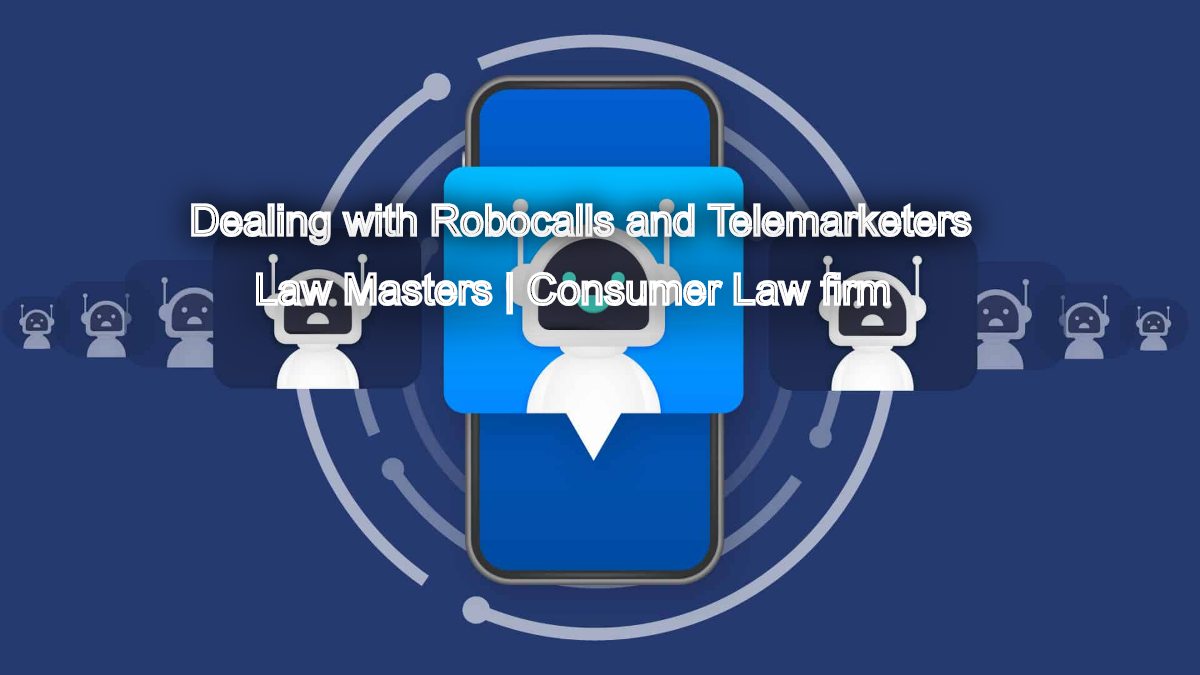Understanding Your Rights Against Robocalls & Telemarketers
Understanding Your Rights When Dealing with Robocalls and Telemarketers: Law Masters
Introduction
In today's digital age, unsolicited calls from robocallers and telemarketers have become an increasingly pervasive annoyance. These intrusive calls can disrupt our daily lives, waste our time, and even lead to scams. However, consumers are not powerless against these unwanted intrusions. The law provides specific protections to safeguard individuals from the nuisance of robocalls and telemarketing. By understanding your rights and knowing how to respond to these calls, you can take control of your communication and protect yourself from scams.

The Robocall Problem
Robocalls are automated calls that use recorded messages to deliver a message. They can be used for legitimate purposes, such as informing consumers about important updates or promotions, but they are often used for scams and fraudulent activities. Robocalls can be particularly annoying and disruptive, as they can occur at any time of day, even during dinner or while sleeping.
Telemarketing Calls
Telemarketing calls are live calls made by individuals or companies to promote products or services. While telemarketing is legal, it is subject to certain regulations to protect consumers from harassment and fraud. These regulations include restrictions on the times of day when calls can be made and requirements for telemarketers to provide certain information to consumers.
Your Rights as a Consumer
Under both federal and state law, consumers have specific rights when it comes to robocalls and telemarketing. These rights include:
- The Do Not Call Registry: The National Do Not Call Registry is a federal government database that allows consumers to register their phone numbers to be excluded from receiving unsolicited telemarketing calls. Once registered, telemarketers are prohibited from calling your number unless you have had a prior relationship with the company.
- The Telephone Consumer Protection Act (TCPA): The TCPA is a federal law that prohibits unsolicited telemarketing calls to residential phone numbers. It also places restrictions on the use of automated dialing systems and artificial voice recordings.
- State Laws: In addition to federal law, many states have their own laws that provide additional protections for consumers from robocalls and telemarketing. These laws may include restrictions on the times of day when calls can be made, requirements for telemarketers to identify themselves, and penalties for violations.
How to Respond to Robocalls and Telemarketers
If you receive an unwanted robocall or telemarketing call, there are several steps you can take to protect yourself and reduce the frequency of these calls:
- Hang Up: The most effective way to deal with a robocall is to simply hang up. Do not engage with the caller, as this may encourage further calls.
- Register with the Do Not Call Registry: If you are receiving unsolicited telemarketing calls, register your phone number with the National Do Not Call Registry.
- File a Complaint: If you believe that a robocall or telemarketing call violates the law, you can file a complaint with the Federal Trade Commission (FTC).
- Use Call Blocking Technology: Many phone carriers offer call blocking services that can help you filter out unwanted calls.
- Be Cautious of Scams: Be aware of common scams associated with robocalls and telemarketing, such as phishing scams, debt collection scams, and prize scams. Never provide personal information or financial data to an unknown caller.
The Role of Law Masters
If you are experiencing persistent issues with robocalls or telemarketing, and you believe your rights have been violated, it may be beneficial to seek legal advice. Law Masters is a consumer law firm that specializes in protecting the rights of consumers against unfair and deceptive business practices, including those related to robocalls and telemarketing. Their experienced attorneys can help you understand your legal options, file complaints, and potentially seek damages.
Read More
- Protecting Seniors from Consumer Fraud and Financial Exploitation
- Dealing with Unfair Debt Collection Practices: Know Your Rights
- Avoiding Scams: Red Flags to Watch Out for as a Consumer
- Resolving Billing Errors and Disputes: Steps to Take as a Consumer
- Spotting Consumer Fraud: How to Protect Yourself from Scams
- Department of Consumer Affairs:
Conclusion
Robocalls and telemarketers can be a nuisance, but consumers have the right to protect themselves from these unwanted intrusions. By understanding your rights and taking appropriate action, you can reduce the frequency of these calls and protect yourself from scams. If you are facing persistent issues with robocalls or telemarketing, Law Masters can provide the legal expertise and support you need to protect your rights and achieve a positive outcome.